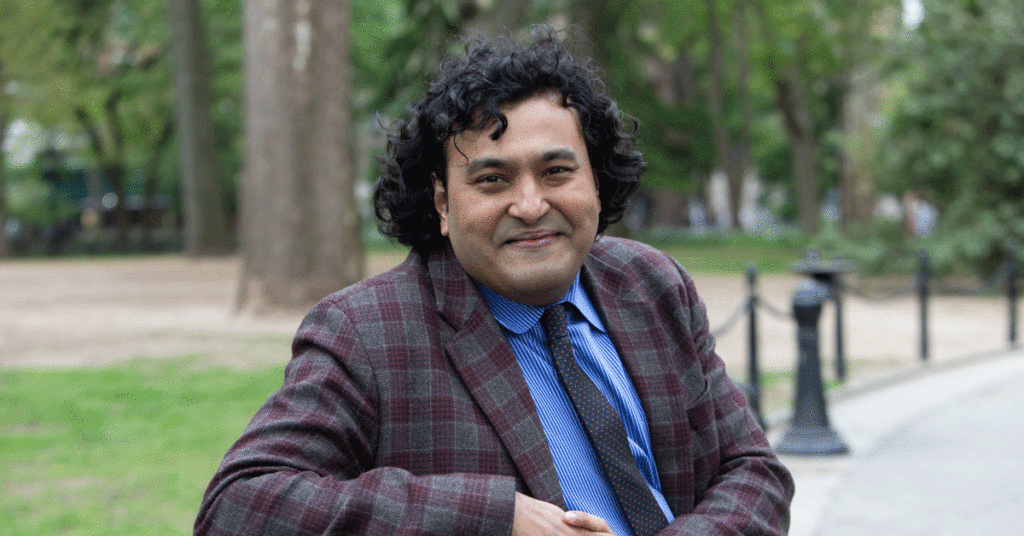A pandemic business assessment
 Wheaton Professor Imran Chowdhury sees growing opportunities for entrepreneurs
Wheaton Professor Imran Chowdhury sees growing opportunities for entrepreneurs
Associate Professor of Business and Management and Diana Davis Spencer Chair of Social Entrepreneurship Imran Chowdhury during the 2021–22 academic year again will be working with students who participate in the Social Entrepreneurship Launch Program. He helps guide them from idea to execution of their own social enterprises. In May, he led students in organizing and presenting the first Wheaton College Social Impact Conference. Magazine editor Sandy Coleman recently checked in with Chowdhury to ask him to share his insights on the changes he has seen in the business world during the pandemic.
What major changes in business have you seen during the pandemic?
“The global nature of the public health crisis brought on by the pandemic has had a major impact on traditional businesses, social enterprises, nonprofits and governments. Most clearly, the disruptions can be seen in buying patterns, the effect on the global supply chain and an increased emphasis on health and safety. Many of these changes are likely to linger in the years to come.
“For instance, in terms of buying habits, the shift to online purchases and e-commerce in the United States and elsewhere made this mode of shopping concrete for many who might not have seriously considered it prior to the pandemic. Some of this shift will remain even as we, sometimes quite happily, go back to in-person shopping, where we may see more use of hybrid modes combining in-person and online shopping [buy online/pickup in store].
“In terms of the social impact of business, we saw that many businesses worked together with their local communities to develop solutions to the problems they were facing—from manufacturing face shields and ventilators or hand sanitizer to distributing food and essential services to the needy. These solutions were often offered at or below cost, or supported by philanthropy or emergency government support.”
Is there an increased interest in engaging in businesses that have social impact?
“I think there is absolutely more interest. Many of the students I work with, including in my ‘Social Entrepreneurship and Innovation’ course and the First-Year Experience [FYE] course on the United Nations Sustainable Development Goals that I teach with Assistant Professor of Political Science Jonathan Chow, have aspirations to create social impact in their work. They want to do this either by directly engaging with social enterprises as employees or founders, or by creating social impact through volunteering, doing policy-related work or through other forms of engagement. This mirrors what many have noted about younger workers: Millennials and Generation Z individuals want to have an impact through the work they do; they are not simply looking for a paycheck in their professional lives.”
Why now during one of the most challenging times in history?
“Part of this stems from the shared experience of the COVID-19 pandemic. Nearly everyone around the world went through it or experienced the impact in some way. This is somewhat unprecedented in human history, and I think it has demonstrated the need for a focus on the greater good, on working together for shared outcomes that can benefit everyone.”
“I’ll give you a quick example. In early July, I moderated a panel discussion at the 2021 Society for the Advancement of Socio-Economics conference. Our focus was on the commodification of time in the modern economy, and, in particular, in the workplace. We understood before the pandemic that the increasing demands on employees to be productive and efficient poses new challenges on our ability to balance the amount of time we dedicate to our work and to our life outside work. COVID-19 demonstrated this in stark terms: some of us were lucky enough to be able to work from home and be with our families during this difficult period. That wasn’t easy, and it was often difficult to tell when our work world ended and our personal lives began. Others had an even more difficult and precarious time: they were needed as ‘essential workers’ and had to leave their homes, often traveling on public transportation, to go to work. They were also much more likely to be exposed to COVID-19, and, in the United States at least, many of these essential worker positions were disproportionately held by traditionally disadvantaged groups and racial minorities.
“It’s important that we discuss these disparities. We have been doing this at Wheaton and our students are listening. They are keenly aware of these disparities in the workplace and in other domains, and I know that many of them will go on to address these issues in the course of their careers.”
What are you excited about for the 2021–22 academic year?
“I’m looking forward to the FYE that I’ll be teaching with Jonathan Chow [‘A Better and More Sustainable Future for All: Policy, Social Innovation, and the Politics of the UN Sustainable Development Goals.’] We taught this FYE for the first time in fall 2020 and had a great time with it; the students were really engaged and had some great ideas for tackling different issues in their communities by developing social enterprises or other impactful solutions.
“The Social Entrepreneurship Launch Program is now included on the list of Sophomore Experiences as part of the Compass Curriculum. I expect that we will have greater interest. I’ll also be teaching sections of ‘Social Entrepreneurship and Innovation’ and a senior research seminar.
“And we will be introducing a new internship program in partnership with Social Enterprise Greenhouse [SEG] in Providence, where selected students will have the opportunity to complete paid summer internships in 2022 with entrepreneurial ventures that focus on creating positive social impact. Students will gain real-world, professional experience in a startup/social enterprise environment while receiving mentorship and support both individually and as a cohort with the support of SEG.”
